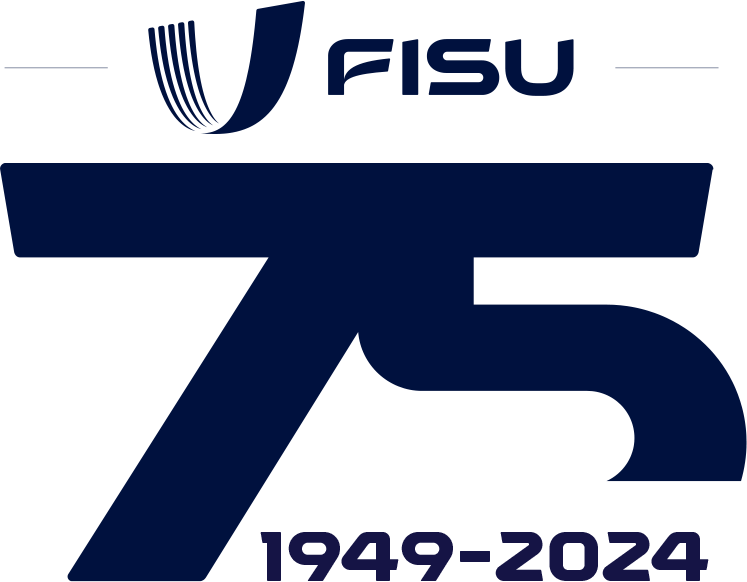Archery, now a fully-fledged Olympic sport, has grown exceptionally in university sports circles over the last 15 years. This exemplary sport combining rigour and harmony, and requiring an impressive physical condition and extreme concentration, has everything to attract students.
Actually, archery can be practiced at a personal pace, without major constraints on timetables and it perfectly integrates the context of university studies. Since 1996, when the first World University Archery Championship was held in Vaulx-en-Velin, France, the discipline has become increasingly popular among the sports on the FISU programme. At the last Universiade that took place in Daegu, Korea, archery was chosen as an optional sport. There too, it was a great success, attracting some of the world’s best archers. True, Korea enjoys superb facilities and the organization was excellent. The fifth World University Archery Championship held in Spain was no exception, although participation was a bit less than anticipated due to the particularly demanding timetable of archery meets. In fact, the Championships came just after the Junior World Championships (in Great Britain) and the Junior Grand Prix (in Antalya, Turkey) and just before the Olympic Games in Athens.
Nevertheless, organizers were able to count on the presence of some great champions like the American Mary Zorn, for example, the world’s second best at the compound bow, as well as Korean Hyun-Jung Lee who won the bronze medal for his team and the gold medal for individual performance at the last World Championships (of the International Archery Federation – FITA) in New York. In all, 122 archers (65 men and 57 women) from 21 countries competed in Madrid.
Madrid Polytechnic University
The Madrid Polytechnic University again took charge of organizing these championships as it did in the year 2000 when the meet was first held in the summer configuration – outdoors over longer distances (70 m on 1.22 m targets). This university seems to be perfectly suitable for this kind of sports event, since it also hosted the Forum in 1996 and the Rectors Forum in 2004. The Rector Javier Uceda had the pleasure of starting off the Championships at the Opening Ceremony on the archery field. Juan Carlos Holgado, the technical chairman for archery at FISU came with Jim Easton, FITA President, who made the trip especially for this event. This gave us an opportunity to ask him a few questions.

FISU-FITA Relations? Excellent!
How do you envisage the development of archery at university level? Jim Easton: “Archery is very popular at universities. Whatever the weight, height, physical strength of the archer, success for him or her depends exclusively on his/her efforts and determination to continually surpass his/her own limits. This is a very gratifying sport. It helps archers develop their mental faculties and increase their level of concentration. It’s important to note that the best results in the discipline are obtained between 18 and 22 which often coincides with university studies.
This was the case at the Olympic Games in Barcelona as well as the Universiade in 2003. In fact, I consider the Universiades and the World University Championships as key events for developing archery worldwide and I hope that the competitions will continue to be as successful as they are today. They are really a magnificent step on the path to Olympic results”.
How do you see the collaboration between FISU and FITA in years to come? Jim Easton: “We are very pleased with the collaboration that has developed with FISU in recent years. Archery is now an integral part of the international university sports calendar. The sport will be included in the programme for the next Universiade (Izmir, 2005) and I hope I can encourage the organizers of the Universiade in 2007 (Bangkok) to include archery in the programme as well. In fact, we would like to see our sport become one of the mandatory sports for the Universiade, but I know that the competition is rough …”

High Level
So the tone had been set, and this week’s results for the events show that Mr. Easton was perfectly right. The level in fact was very high. The Koreans achieved noteworthy performances which won them three gold medals (out of four) in individual events (Hyun Jung Lee, Dong Hyun Gye, Yong Hee Choi) and a team gold medal in the men’s compound bow events.
Mary Zorn and Amber Dawson took a very handsome double win in gold and silver in the individual compound bow; and while they were at it, their team also came in first in the same category. China topped the chart for the women’s team recurve bow ahead of Korea, while Chinese Taipei took this discipline for the men, again ahead of Korea. The Korean archers were particularly brilliant in Daegu, but it’s true they were playing “at home”. In Madrid they confirmed their skill, and the question is now who will be able to beat them at the next meet scheduled in 2005 in Izmir.
Finally, Korean Sung Hyun Park, gold medal winner for the women’s recurve bow at the last Universiade in Daegu 2003 did a spectacular job at the Olympic Games in Athens, taking home the gold medal for this category!
